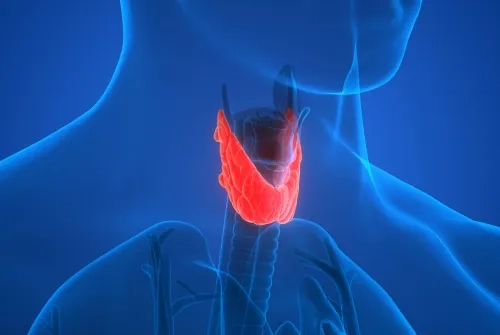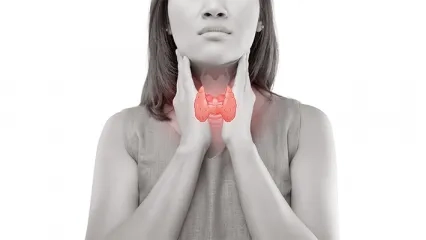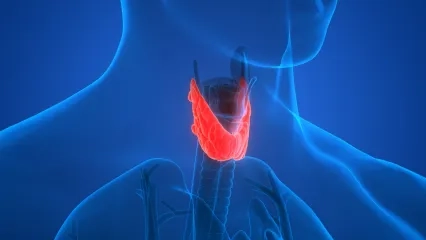Alo Yeditepe
Alo Yeditepe
Questions About Thyroid Diseases
Yeditepe University Koşuyolu Hospital General Surgery & Endocrine Surgery Specialist Prof. Dr. Erhan Ayşan answered the questions about Thyroid Diseases.
Which Diseases Occur Due to Problems in the Thyroid Gland?
Many diseases can develop due to problems in the thyroid gland. Because the thyroid gland is like the gas pedal of the body. If the thyroid gland is underactive, everything in the body, from the speed of thinking to the speed of movement, slows down. However, many problems such as hair loss, skin dryness, constipation, and visual impairment are among the problems that may arise due to the under-activity of the thyroid gland.
In the case of overactivity of the thyroid gland, the opposite of these symptoms occurs. Everything in the body speeds up. Weight loss increases, body rhythm is disturbed, more sweating is experienced and the person becomes a more active person. He/she can stay up with less sleep, but the person feels much more tired. Therefore, thyroid-related diseases cause discomfort in almost every part of the body.
Are Thyroid and Goiter the Same Thing?
The thyroid is our organ located just in front of the neck, under the protrusion defined as Adam's apple. At this point, it is the definition of goiter as a disease that is misunderstood and incorrectly expressed. So, is goiter a disease? If it causes a complaint, “yes, it is a disease.” If the goiter does not cause any discomfort, does not cause pain, is not overactive, and does not form a nodule, that is, if it only gets larger, it is not a disease. It is possible to express this situation as follows. For example, if a large nose does not cause a breathing problem, it is not a sick nose. Or, if a large ear does not cause a hearing problem, it is not defined as sick. Likewise, enlargement of the thyroid gland is called goiter. If it does not cause any problems, it is not a disease. In short, the thyroid is our healthy organ, and the goiter is the enlarged state of this organ.
How is Hyperthyroidism Treated? What Are the Points to Be Considered About This Issue?
Before deciding how to treat hyperthyroidism, it is necessary to define what the disease is. “Hyper” in Latin means too high. The condition of an overactive thyroid gland is also defined as “hyperthyroidism.” In the case of hyperthyroidism, the thyroid hormones T3 and T4 are secreted in excess. Things to be considered in people with hyperthyroidism are listed as follows: First of all, everything in the body from brain functions to sleep patterns, from weight control to heart rhythm will accelerate. And it is important to be aware of this change and act as quickly as possible when complaints arise. Hyperthyroidism can be diagnosed with an increase in these hormones after a blood test. Then treatment is started.
What are the Symptoms of an Enlarged Thyroid Gland?
One of the signs of enlargement of the thyroid gland is the enlargement and thickening of the throat just below the protrusion defined as Adam's apple. However, this is one of the rare findings. This goiter, which is not visible from the outside, is known as an "internal goiter" among the people. In this case, since the growth is inward, it is not noticed from the outside. So, it is not noticeable. Other signs of an enlarged thyroid gland include:
Difficulty in swallowing: In front of our throat is the trachea and just behind it is the esophagus. In case of enlargement of the thyroid gland, difficulties in swallowing may be experienced.
Difficulty in breathing: One of the issues that people who experience thyroid gland enlargement complain about is difficulty in breathing. Patients describe the situation as “it feels like I've been suffocating for a while.” The reason for this important finding is that the two wings of the thyroid gland, described as butterfly-shaped, press on the respiratory tract.
Headache: Since the vessels going to the brain pass through the neck region, in case of enlargement of the thyroid gland, it also puts pressure on these vessels. This can cause headaches by making changes in blood flow to the brain.
Is There a Connection Between Thyroid Diseases and Pregnancy?
The conception in thyroid patients is related to hormone levels. If T3 and T4 hormones are normal, there is no problem with the conception and pregnancy process. At this point, it is important to have hormone tests performed regularly and be under the control of a physician.
What is the Importance of Regular Use of Medications in Thyroid Diseases?
As with all chronic diseases, the correct and regular use of medications for thyroid is extremely important. However, it is not as important as the sensitivity at the time of use of the medications of diabetes patients. Thyroid medications are stored in the body and are used up from stores. For this reason, not taking the medications for a day or two does not cause a serious problem for the patient. However, it is necessary to try to take the medications regularly.
Is There a Connection Between Hashimoto's Disease and Osteoporosis-Osteopenia?
Both diseases are linked to each other. A person with Hashimoto's thyroid will experience slowing down in every part of the body. When the body slows down, the calcium turnover in the bones slows down along with the bone turnover. Therefore, osteoporosis may occur. This condition is more common in older women, especially in postmenopausal women. Postmenopausal osteoporosis is a common problem, however, the fact that the woman experiences Hashimoto's disease can make the picture worse.
What Should People with Removed Thyroids Consider In Their Diet?
In general, iodine is of great importance for thyroid patients. Especially patients who have undergone surgery. Salt is the most natural source of iodine. Therefore, iodized salt should be consumed. Salts that are available in the markets and that have the phrase "iodized salt" on them should be preferred.
Do Thyroid Medications Cause Weight Gain?
There is a common misconception among thyroid patients, especially female patients, that thyroid medications cause weight gain. This is extremely wrong information. Because thyroid drugs help to lose weight when used regularly rather than causing weight gain. On the contrary, not using thyroid medications in the right way and dose causes weight gain. Because the metabolism gradually slows down, everything that is eaten is stored as fat. However, if you take thyroid medications in the right way and dose, they are quickly dissolved, consumed as fuel, and excreted from the body.
What Is T3 and T4 Test? What Does High or Low-Value Mean?
One of the most important points of curiosity is what it means to have low or high values of T3 and T4 hormones secreted from the thyroid. After being produced by the thyroid, these hormones are released into the blood. These hormones, which generally determine the rate of metabolism, act as catalysts in many metabolic and biochemical events. High levels of thyroid hormones can be called hyperthyroidism, i.e., overactivity, and low levels of thyroid hormones can be called hypothyroidism.
What Does It Mean to Have a High or Low TSH Level?
Thyroid Stimulant, which is defined as “TSH” in short, is secreted from the pituitary gland in the brain. The task of TSH is to determine the rate of secretion of T3 and T4 hormones. When TSH is secreted too much, the thyroid is stimulated very much and accordingly T3 and T4 hormones begin to be secreted more. When TSH is released less from the brain to the thyroid, the secretion of T3 and T4 hormones also decrease. However, understanding what TSH means and the health consequences it can have requires specialization. However, it is possible to say that its high and low values are effective in determining the level of T3 and T4.
What Problem Occurs If the Thyroid Gland Becomes Underactive and What Kind of Symptoms Does It Show?
Underactivity of the thyroid gland means that the metabolism slows down. The most important finding is weight gain. At this point, it is necessary to define the border very well in order to eliminate some misunderstandings. Underactivity of the thyroid gland can of course cause weight gain. However, it will not be right to associate only the underactive thyroid with all weight problems. In fact, obesity is a huge problem with many underlying causes. Underactivity of the thyroid is just one of them. For this reason, T3 and T4 hormones come to the forefront among the first tests requested for a person who consults a doctor due to a weight problem. If a problem is detected here, it is referred to an endocrinologist.
Another important indicator of under-activity of the thyroid gland is hair loss. Especially in women. Another symptom is dry skin. Complaints such as "my skin is flaking, falling out, there is a deep coarsening in my hands", which are also more common in women, are also signs of under-activity of the thyroid gland. Nail disorders, nail breakage, and constipation can also indicate that the thyroid is underactive.
How to Treat Hyperthyroidism?
Medications are used in the treatment of hypothyroidism. There is no surgical intervention here. With drugs, the hormone that the thyroid gland does not secrete is given to the patient externally. At this point, it is important to determine the appropriate dose for the patient. Depending on the level of the hormone in the blood, a different dose of medication is administered to each patient by the physician. For this reason, since it would not be the right approach to call it medication therapy, it would be more accurate to call it replacement therapy. Just like diabetic patients take the deficient insulin for themselves from outside.
What is Hashimoto's Thyroid, One of the Most Common Thyroid Diseases?
Hashimoto's disease is hyperthyroidism, a disease of the underactive thyroid. Since it is one of the most common diseases, it is better recognized by patients. In Hashimoto's thyroid, no organisms such as viruses, bacteria, or parasites enter the body from the outside. The body develops a protein against its own organ, the thyroid, and this protein causes damage. Triggering factors are also important for Hashimoto's disease, which is included in the group of autoimmune diseases, that is, the diseases in which the body harms itself. Stress is often effective. A heavy sadness, heavy stress, or some problems in daily life trigger the emergence of the disease.
What is Toxic Goiter? Is Toxic Goiter Dangerous?
Toxic goiter is a disease that occurs when the thyroid gland is overactive, that is, when it produces too much hormone. When the hormones reach a toxic dose, that is, they rise excessively in the blood, changes in metabolic activities occur and everything starts to accelerate. These patients usually consult the physician with the complaint of palpitation. “It is like it's fluttering on my left chest side. Whether I walk, sit, or rest, this continues.” There is a significant difference between the palpitations occurring at rest and during exertion. The underlying cause of palpitations while climbing stairs, walking on the road, or coming home from the market is usually related to the heart. However, this is important if palpitations are still felt while sitting, watching TV, or chatting. In this case, there may be an underlying thyroid disease. In other words, it is necessary to pay attention because palpitation that occurs during exertion can be an important sign of toxic goiter, that is, hyperthyroidism.
When Should a Thyroid Ultrasound Be Performed?
Thyroid ultrasound is an extremely important method in the diagnosis of thyroid diseases. With this method, which is defined as the stethoscope of the physicians who are specialized in endocrine, a kind of photograph of the thyroid is taken. After the ultrasound probe is placed on the patient's neck, the thyroid structure is mapped. Thyroid ultrasound, which should be a part of a routine endocrine examination, does not harm the patient as it does not contain harmful rays.
What Is Fine Needle Biopsy and When Should It Be Performed?
It is the biopsy procedure performed in some cases with nodules in the thyroid if the physician deems it necessary. In the nodules detected in different parts of the body, the biopsy procedure, which is usually performed by entering through small incisions, is performed with the help of a needle, since the thyroid is a naive organ. After the ultrasound-guided procedure, a piece of cellular size is taken from the nodule and sent to pathology. By obtaining information about the content of the nodule with the special dyes used by the pathologists, the information is obtained whether the patient has cancer or not. Fine needle biopsy is completed in a few minutes.
What Does Swelling of the Thyroid Gland Mean?
Enlargement of the thyroid gland means goiter. In case of enlargement of the thyroid gland, compression symptoms may occur, or nodules may form. However, there is an important element at this point. It does not mean anything if it does not cause any complaints despite the enlargement of the thyroid gland. It just means you have a large thyroid gland. However, if nodules or masses appear, the problem has become a disease and must be treated.
Do Thyroid Diseases Cause Hoarseness?
Although very rarely, hoarseness may occur due to thyroid disease. However, in people with thyroid disease and accompanying hoarseness, this indicates advanced-stage disease. The result is either an enlarged thyroid or a malignant tumor. However, hoarseness due to thyroid disease is a very rare condition.
Are All Thyroid Nodules Cancer?
Nodule means a mass. However, not every nodule is cancer. This distinction is a situation that frequently makes patients confused and worried. Statistics also show that not every nodule is cancer. Namely, while only 5 percent of thyroid nodules are cancer, 95 percent are benign. However, after the nodule appears, it is absolutely necessary to consult an endocrinologist for its evaluation.
What Are the Symptoms That Show the Presence of Nodules in the Thyroid?
Many nodules progress silently and therefore do not give any symptoms. For this reason, most of the patients are detected by chance at the end of the examinations performed for different reasons. For example, MRI for neck pain is imaging that allows incidental detection of thyroid nodules. The reason for this is that nodules give findings very rarely. In other words, although nodules are common, they are rarely symptomatic. However, it is necessary to be careful, as the absence of symptoms does not mean that there is nothing. This is where early diagnosis comes into play.
What Is the Importance of Early Diagnosis in Thyroid Nodules?
In thyroid cancers, as in other cancers, early diagnosis is extremely important in terms of the course of the disease. For example, it is possible to save the patient from a life-threatening situation with a correct surgical intervention for a malignant nodule that is detected below 2 cm.
Is Surgery Necessary in the Treatment of Thyroid Nodules?
Surgery is not necessarily recommended for all thyroid nodules. Tumors that do not have cancer risk and are not very large are usually followed up. It is observed whether there is a change or not, by making the necessary controls in the periods determined according to the patient's condition and the physician's request. After the physical examination and thyroid ultrasound, if the physician deems it necessary, a biopsy can also be performed if there is a suspicious situation.
How to Approach Large Nodules Without Suspicion of Cancer?
Nodules with a diameter of 3-4 cm or more are defined as large nodules. Non-surgical treatment methods come into play in these nodules, which are free of cancer risk. Today, "radiofrequency ablation", one of the most frequently used methods in the world, is used. This procedure, which is performed without the need for general anesthesia, is based on the principle of penetrating the nodule with a special needle and burning it. After the procedure, the nodule does not grow again.
How to Perform Thyroid Surgery?
The thyroid is a butterfly-shaped organ. And depending on the location of the nodule, an operation can be performed in which one side or all of it is removed. There are many reasons why surgery is performed unilaterally or bilaterally. The physician will make this decision according to the patient's condition.
Thyroids require experience during surgery due to the sensitive area they are located in. The area with nodules is removed with the help of incisions made from the neck area. In patients without very large nodules, an incision of 3-4 cm may be sufficient. Since the nerves to the vocal cords also pass through here, it is necessary to be very careful. Today, with devices that show vocal cords and vocal nerves in operating rooms, it is possible to prevent possible complications in this regard.
Another possible complication of thyroid surgery is the removal of the parathyroid glands during surgery. Located just behind the thyroid, these special glands the size of a grain of rice are the body's smallest organs that regulate calcium in the blood. It is very important to leave these structures in place during thyroid surgery.
What Happens If Thyroid Diseases Are Not Treated?
If thyroid diseases are not treated, first of all, the patient's complaints continue to increase. For example, a person whose hypothyroidism is not under treatment gradually gains weight, becomes inactive, and many metabolic problems continue to occur. If hyperthyroidism is not treated, palpitations continue, and the patient develops heart problems. There is also the state of nervousness that thyroid patients often experience. This situation can seriously affect both the patient and his/he relatives. Therefore, if thyroid diseases are not treated, they continue to significantly affect the quality of life of the person.
About
Faculty and Year of Graduation:
Istanbul University, Cerrahpasa Faculty of Medicine, 1994
”
See Also
- What is a Parathyroid Adenoma? Symptoms and Treatment
- What is Calcitonin Hormone? Calcitonin Hormone Deficiency
- If the Size of the Thyroid Nodule is Over 4 cm, Be Cautious!
- How Does High Calcium in Blood Cause Complaints?
- A First in the Literature: Parathyroid Cell Obtained from Thyroid Stem Cell
- Diagnosis in Thyroid Diseases
- Assessment of Hyperthyroidism
- Hashimoto's Thyroid Disease
- Thyroid Tumor (Cancer)
- Graves' Disease
- Thyroid Nodules
- Thyroid Surgery
- Assessment of Hypothyroidism
- What is the Harm of High Calcium in the Blood?
- Frequently Asked Questions in Thyroid Diseases
- Atomic Therapy (Radioactive Iodine Therapy)
- Which Thyroid Nodule Can Be Treated Without Surgery?
- She Was Relieved of Her Pain When the Missing Parathyroid Gland Was Found in The Chest Cavity
- Thyroid Storm Can Turn Life Upside Down
- Recovered From Thyroid Nodule with Needle Melting Method
- Stress Triggers Thyroid Diseases; These Occupations Are At Risk!
- Turkish Physician Developed a Novel Method for Parathyroid Transplant
- What Should Be Considered After Parathyroid Surgery?
- Parathyroid Diseases and Treatment
- They Said It Was Thyroid Cancer, But It Turned Out to Be Parathyroid Adenoma!
- The Frequency of Thyroid Nodules and Thyroid Cancer in Young People is Increasing!
- Thyroid Cancer Treatment Is Possible Without Removing The Entire Thyroid Gland
- Thyroid Storm
- T4 Hormone in 13 Headings
- Thyroid Diseases
- Goiter (Thyroid Gland) Biopsy
- Radiofrequency Therapy in Thyroid Nodules
- What Is Autoimmune Hypoparathyroidism or Hypocalcemia?
- What Is The Loss of Low Calcium Level in Blood?
- What Is The Symptoms of Calcium Level Elevation (Hypercalcemia)?
- How It Is Made The Parathyroid Adenoma Operation?
- What Is Parathyroid Hyperplasia?
- Parathyroid Tumors
- What Are The Parathyroid Glands?
- The Incidence of Thyroid Cancer Has Increased! There is Turkey in the Research!
- Key Surgery Performed In Turkish Hospital For First Time
Alo Yeditepe







